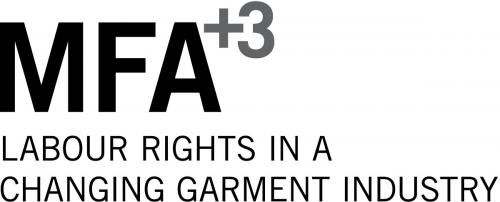WELCOME TO THE ARCHIVE (1994-2014) OF THE MAQUILA SOLIDARITY NETWORK. For current information on our ongoing work on the living wage, women's labour rights, freedom of association, corporate accountability and Bangladesh fire and safety, please visit our new website, launched in October, 2015: www.maquilasolidarity.org
January 9, 2009

On September 30 - October 2, 2008, approximately 60 representatives of women's, human rights, trade union, and other non-governmental organizations from 10 countries in the Americas gathered in San Pedro Sula, Honduras to share information and experiences on the impacts of the end of the import quota system three years earlier in January 2005.
The regional seminar, entitled "MFA+3: Labour Rights in a Changing Garment Industry," was co-sponsored by MSN and the Honduran Independent Monitoring Team (EMIH). It brought together labour and women's rights activists from Honduras, Nicaragua, El Salvador, Guatemala, Costa Rica, the Dominican Republic, Mexico, Peru, Colombia and Argentina.
May Wong of Globalization Monitor, based in Hong Kong, also participated in the seminar as a resource person on labour rights in China and the Asia Floor Wage Campaign.
The Honduras seminar was a follow up to a similar event that took place in Nicaragua in February 2005, also co-sponsored by MSN, in which delegates from the same sectors discussed the possible impacts of the demise of the import quota system under the Multi-Fibre Arrangement (MFA) at the end of 2005.
Plenary session, MFA+3 Seminar, Honduras
The agenda of the seminar included presentations and discussion on the future of the garment industry in the region and internationally; the impact of factory closures; regional and international initiatives to improve labour practices; the reality of workers' lives in China and efforts to defend their rights; and strategic questions including the current and potential roles of national governments and international brands.
Both the formal and informal discussions at the seminar were rich and varied. Some general reflections coming out of the conference are posted in the last section of the report: Looking towards the future
Key materials:
MFA+3 Report navigation